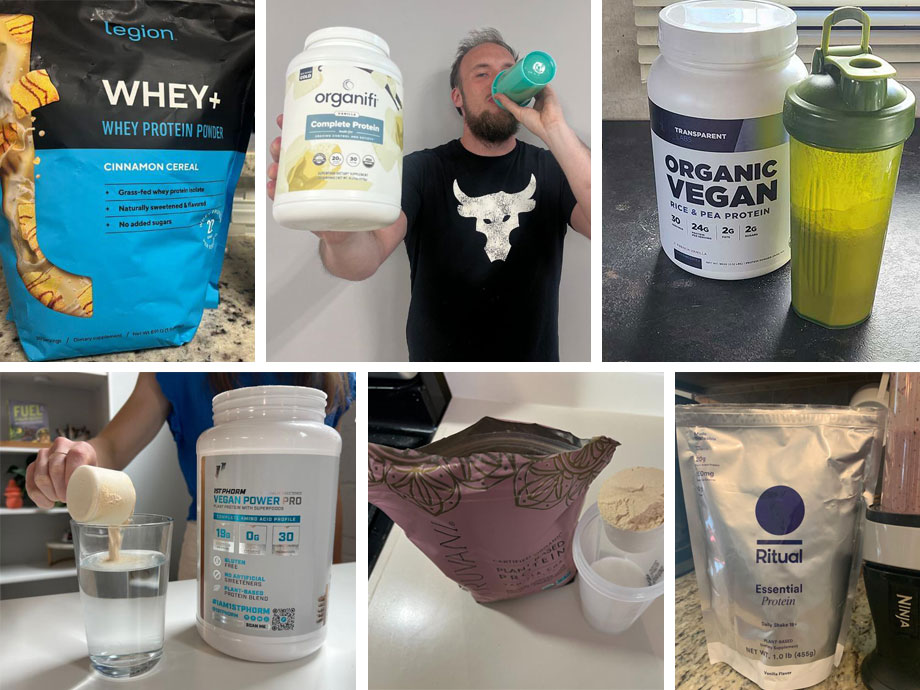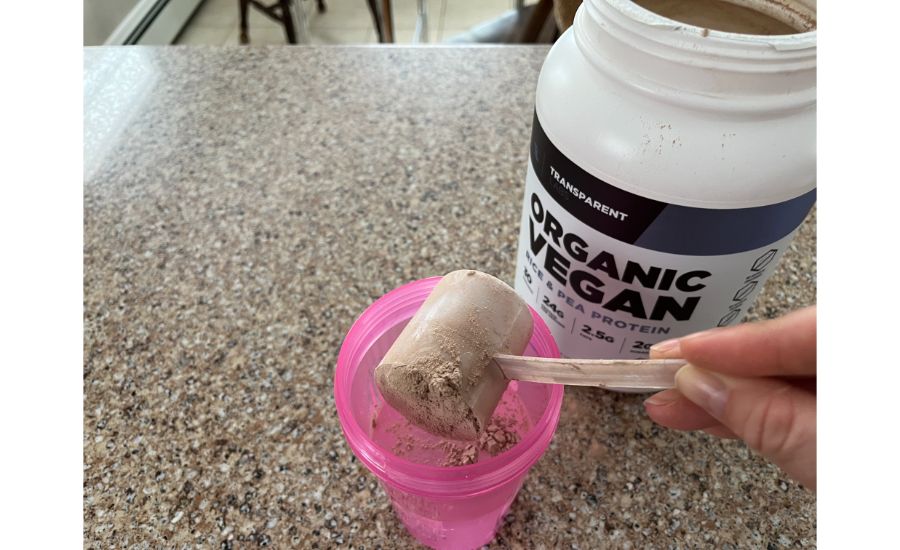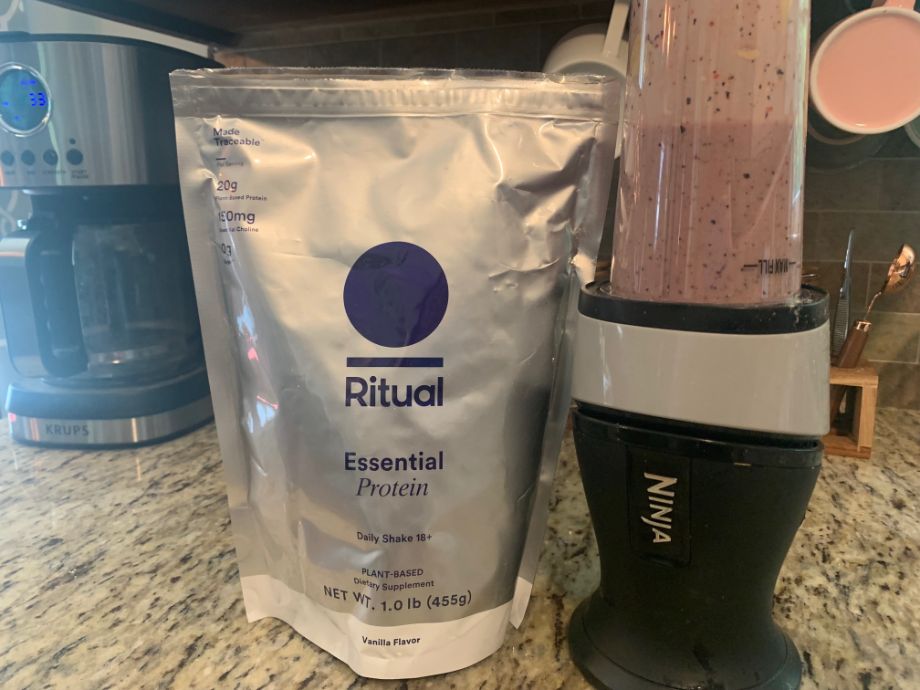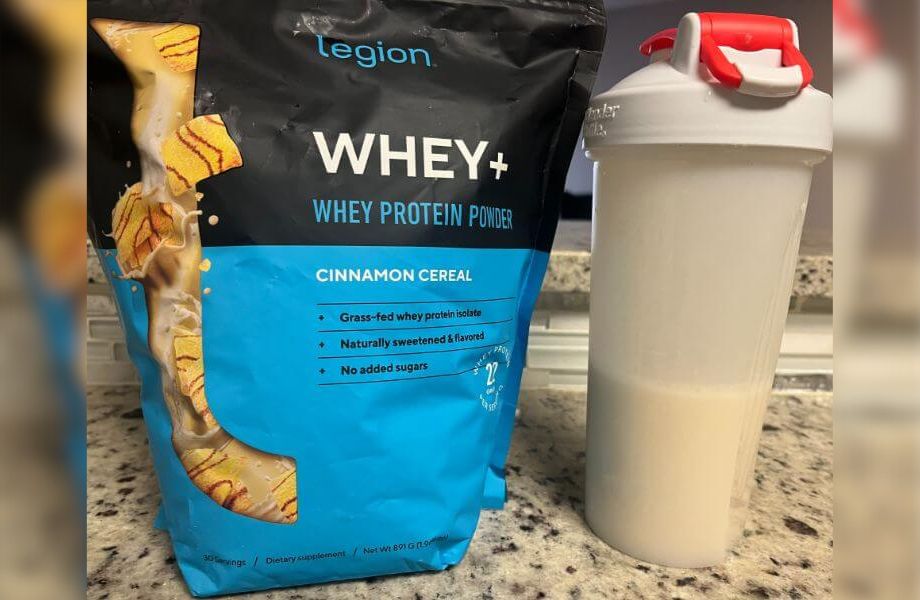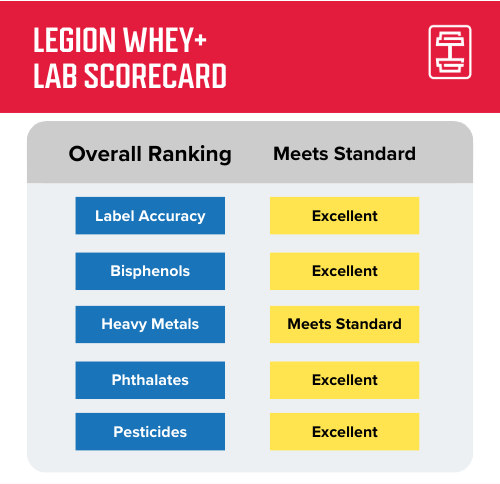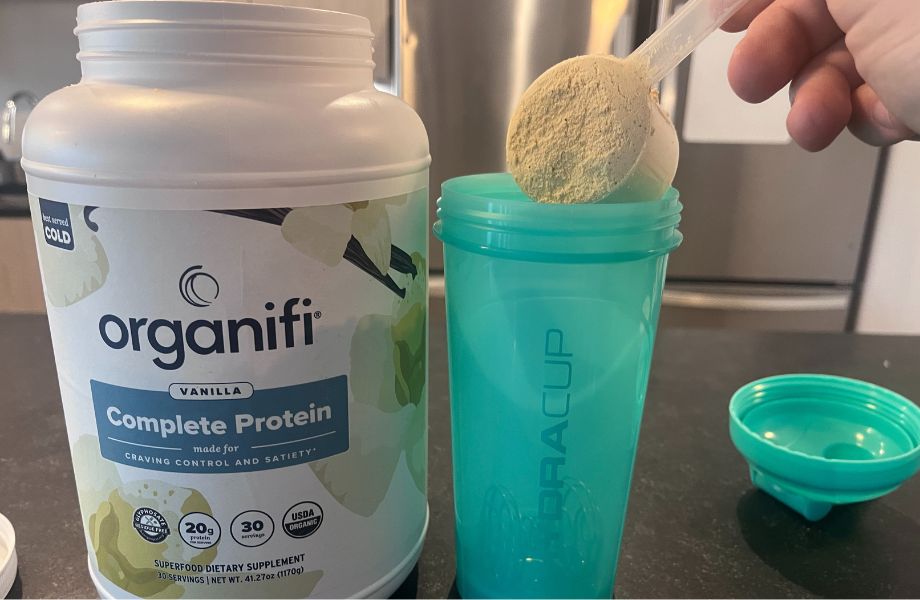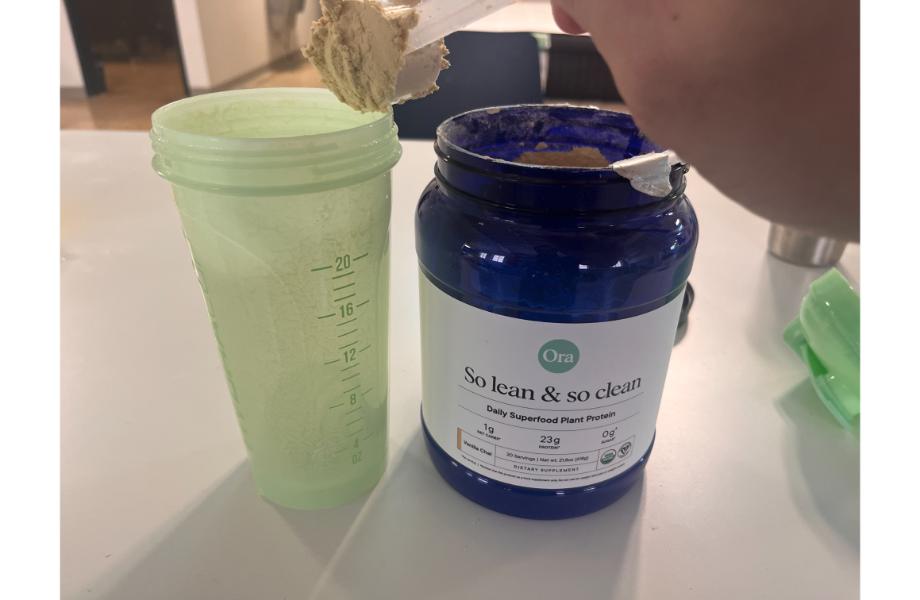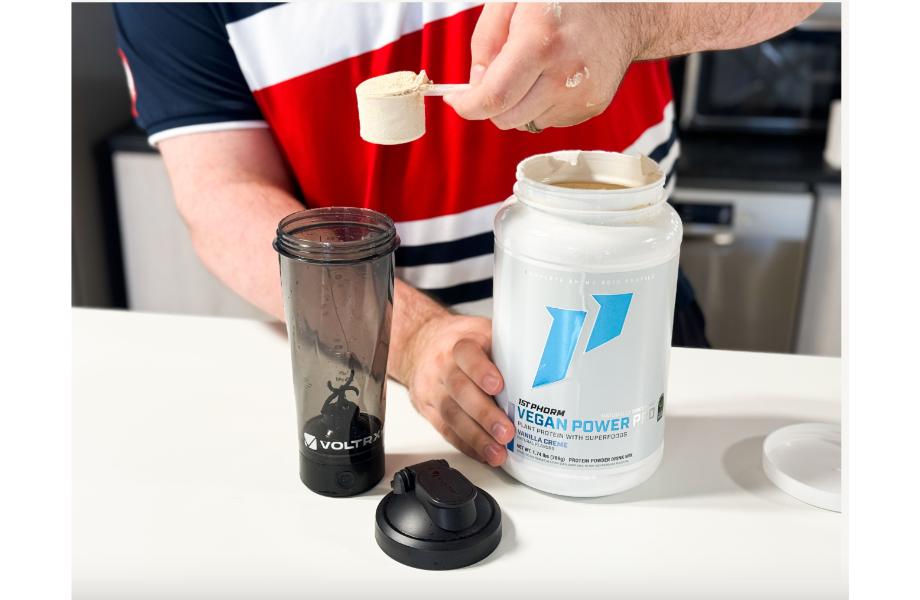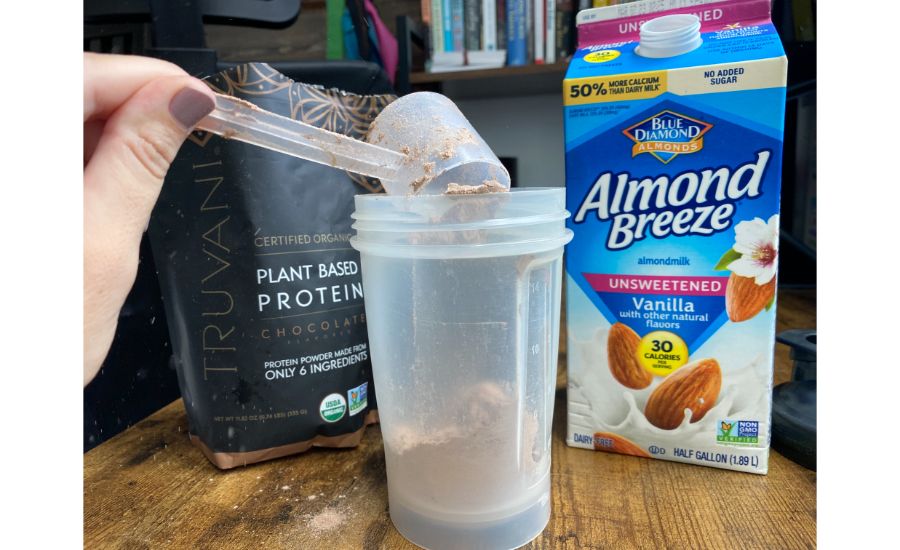We test and review fitness products based on an independent, multi-point methodology. If you use our links to purchase something, we may earn a commission. Read our disclosures.
When you embark on your quest to find the best protein powder, you might consider whether or not it’s casein, whey, pea, soy, and [insert all of the other types of proteins]-based. You might also consider whether it’s organic—but what does that even mean?
The best organic protein powders aren’t nutritionally better for you than non-organic protein powders. Rather, the term refers to how the ingredients were processed and manufactured, along with how the animals were treated (for dairy-based proteins) or what’s in the soil (for plant-based protein powders).
RELATED: Best Protein Bars
These protein powders can help athletes, bodybuilders, and everyday people fill nutritional gaps and make sure they hit their daily protein goals while giving them peace of mind that they’re ingesting only the best ingredients.
We’re a team of certified personal trainers, registered dietitians, competitive triathletes, and weightlifters who know the importance of high-quality ingredients. On top of scanning the ingredients lists for more than 100 protein powders and trying more than 75, our GGR supplement testing methodology looks at important factors such as:
- Formulation: Analyzing protein, carb, and fat content, plus total calories per serving. This can also include considerations around other ingredients, like flavorings or additives.
- Solubility: How well does this product dissolve in the suggested amount of liquid?
- Transparency: Since dietary supplements are not approved by the FDA, having an independent third-party lab verify that what’s on the label is what’s in the protein powder is super important, especially for athletes.
- Price per serving: Price per serving can range from $1.25 on the low end to upwards of $2 on the high end.
Medical disclaimer: This article is intended for educational and informational purposes only. It is not intended as a substitute for medical advice. For health advice, contact a licensed healthcare provider.
Best Organic Protein Powder for 2025
- Best Organic Protein Powder Overall: Transparent Labs Organic Vegan Protein Powder
- Best Vegan Organic Protein Powder: Ritual Essential Protein Daily Shake
- Best Grass-Fed Organic Protein Powder: Legion Whey+
- Best Organic Protein Powder for Weight Gain: Organifi Complete Protein
- Best Organic Protein for Weight Loss: Ora Organic Vegan Protein Powder
- Best Gut-Friendly Organic Protein Powder: 1st Phorm Vegan Power Pro
- Best Tasting Organic Protein Powder: Truvani Organic Plant-Based Protein
- Best Gluten-Free Organic Protein Powder: Vega Organic All-in-One Vegan Protein Powder
Compare Side By Side
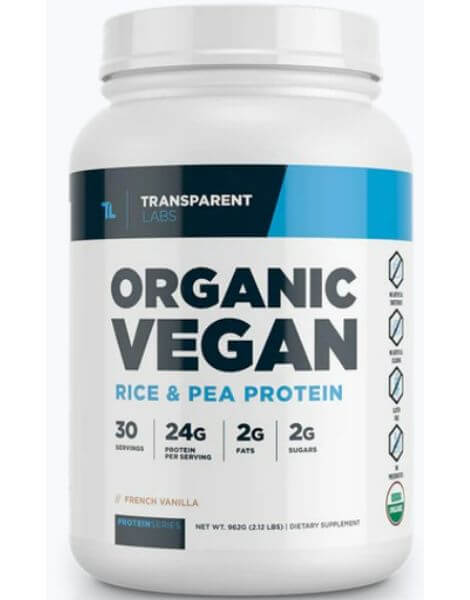 | 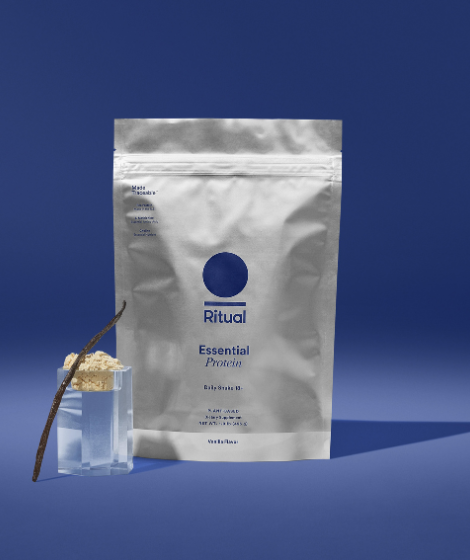 | 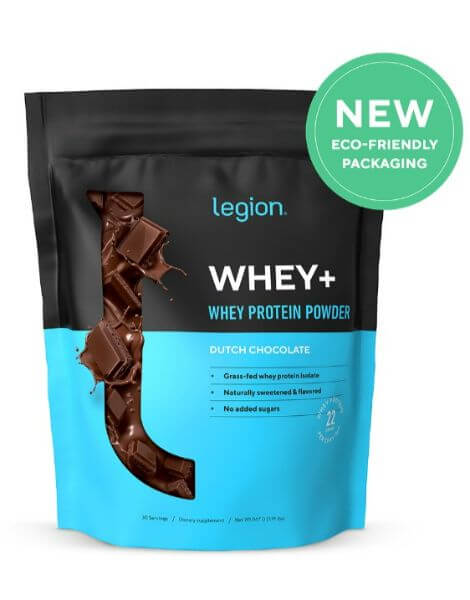 | 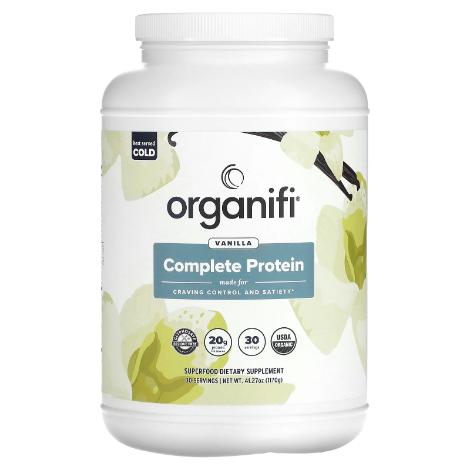 | 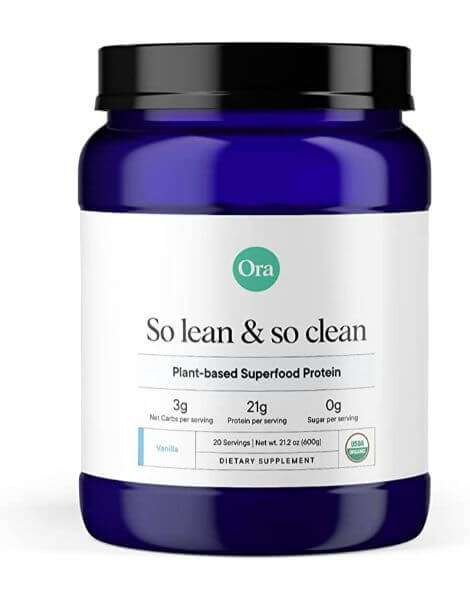 | 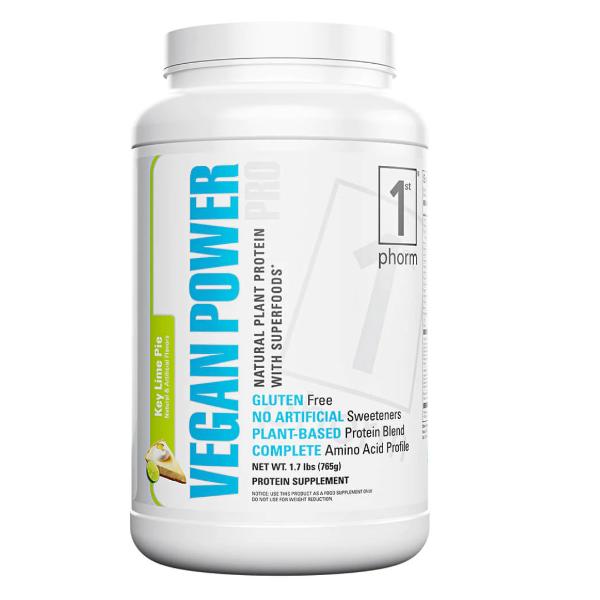 | 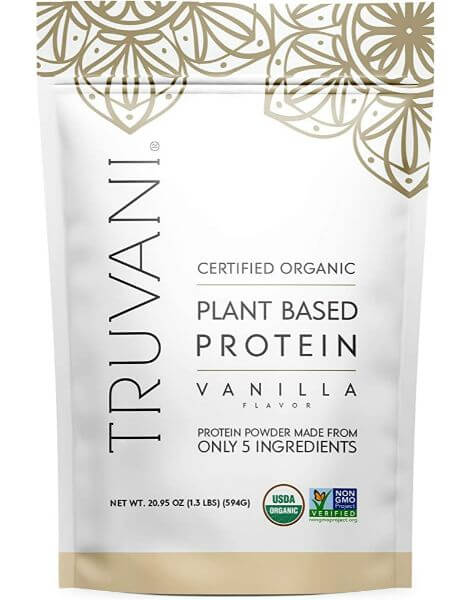 | 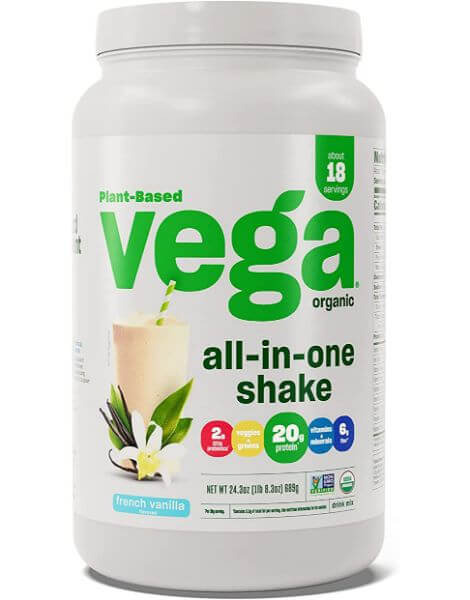 | |
| Transparent Labs Vegan Protein | Ritual Protein | Legion Whey+ | Organifi Complete Protein | Ora Organic Plant-Based | 1st Phorm Vegan Power Pro | Truvani Plant Protein | Vega Organic All-in-One Vegan Protein Powder | |
Rating Our expert product testers, who include certified personal trainers and coaches, use a multi-point testing methodology to determine average ratings out of 5 stars. | ||||||||
| Price Per Serving | $1.67 | $2.66 | $2.00 | $2.67 | $2.50 | $1.83 | $3.00 | |
| Protein Per Serving | 24 g | 20 g | 22 g | 21 g | 20 g | 20 g | ||
| Type | Rice and pea isolate | Pea protein | Whey protein | Pea and rice protein | Pea, chia, and pumpkin seed | |||
| Third-party Tested? | — | — | — | |||||
| Calories Per Serving | 130 | 115 | 100 | 120 | 130 | |||
| Flavors | 2 flavors | 1 flavor | 17 flavors | Chocolate\, Vanilla | 4 flavors | French Toast\, Key Lime Pie\, Iced Oatmeal Cookie\, Chocolate Mint Cookie\, Chocolate Frost\, Vanilla Creme | 5 flavors | |
Best Organic Protein Powder Overall: Transparent Labs Organic Vegan Protein Powder
Good for: Those searching for an all-around, high-quality organic protein powder
Best Overall
Transparent Labs Organic Vegan Protein Powder

Product Highlights
- A rice and pea protein powder
- Rated with 4.3 stars on their website
- Comes in 2 flavors
- 24 g of protein per serving
- Organic product with minimal ingredients
Pros & Cons
Pros
- No artificial sweeteners, colors, or preservatives
- Organic and vegan
- Only 5-7 ingredients
- Reviewers love the taste
- 24 g of protein per serving
- Subscribe and save
- 30-day money-back guarantee
Cons
- Only 2 flavors
- Stevia can cause GI issues for some
- Expensive
Bottom Line
This organic rice and pea protein powder is a good choice for people who want a clean plant-based protein option with minimal ingredients.
Best Vegan Organic Protein Powder: Ritual Essential Protein Daily Shake
Good for: Plant-based connoisseurs who’d be delighted with a decked-out organic vegan protein powder
Best Vegan
Ritual Essential Protein Daily Shake

Product Highlights
- Organic pea protein powder
- 20 g of protein per serving
- Formulated to support adults 18-49
- Third-party tested
- 150 mg of choline per serving
Pros & Cons
Pros
- Soy-free, gluten-free, and vegan-friendly
- No artificial sweeteners
- Complete amino acid profile
- Non-GMO
- USA-grown peas
Cons
- Only comes in one flavor
- Price per serving is on the high end
- Velcro bag closure ineffective
Bottom Line
Ritual’s Essential Protein Daily Shake has 20 grams of protein per serving and 150 milligrams of chlorine (to support brain and nervous system function). This protein powder from Ritual is third-party tested and Informed Sport Certified, which means this formula has been screened for over 250 banned substances.
Best Grass-Fed Organic Protein Powder: Legion Whey+
Good for: Those who want to reap the benefits of grass-fed dairy
Best Organic
Legion Whey+

Product Highlights
- Sourced from small dairy farms in Ireland
- Over 5 g of BCAAs per serving
- Non-GMO and animal welfare approved
- Third-party tested for banned substances
Pros & Cons
Pros
- Low in carbs and fat but high in protein
- Natural ingredients
- Money-back guarantee
- Made with ethically-sourced milk
- Lots of flavor options
- Subscribe and save 10%
Cons
- Comparably high cost per serving
- May be clumpy when mixed
- Some customers thought flavor was too sweet, or in some cases lacked flavor
Bottom Line
Legion Whey+ is a clean, sustainable protein powder that also is macro-friendly and a great option for anyone looking for a clean protein supplement. Many of our testers have bought this with their own money because they love the taste and easy mixability.
Best Organic Protein Powder for Weight Gain: Organifi Complete Protein
Good for: Those who want to increase their caloric intake without eating artificial ingredients
Best for Weight Gain
Organifi Complete Protein

Product Highlights
- 20 g of plant-based protein per serving
- Contains whole food vitamins and minerals
- Certified organic ingredients
- Soy-free, gluten-free, and whey-free
- Available in chocolate and vanilla flavors
Pros & Cons
Pros
- Certified organic
- Minimal ingredients
- Whole food vitamins and minerals
- Money-back guarantee
- Soy-free, gluten-free, and whey-free
Cons
- Only available in two flavors
- Pricier protein
Bottom Line
Made with certified organic ingredients, Organifi Complete Protein is a plant-based protein blend with 20 grams of protein per serving. Available in chocolate and vanilla flavors, this protein is soy-free, gluten-free, and dairy-free, making it great for people avoiding certain allergens—although it does contain tree nuts (coconuts).
Best Organic Protein for Weight Loss: Ora Organic Vegan Protein Powder
Good for: Those who have weight-loss goals and care about organic products
Best for Weight Loss
Ora Organic Daily Superfood Plant Protein

Product Highlights
- Plant-based superfood protein
- Comes in 4 delicious flavors
- 4.2 stars on Amazon with 5,000 reviews
- Free of dairy, gluten, and soy
- Vegan and paleo
- Includes 19 organic superfoods
Pros & Cons
Pros
- Non-GMO, vegan, paleo, and organic
- Plant-based product
- Third-party tested
- Contains 19 organic superfoods
- Free of many common allergens
Cons
- Contains coconut
- A little pricey
- Stevia can cause GI distress in some people
- Some reviewers do not enjoy the taste
Bottom Line
Ora is a well-known brand with positive reviews. It's a good option for those looking for a very clean, organic vegan protein powder.
Best Gut-Friendly Organic Protein Powder: 1st Phorm Vegan Power Pro
Good for: Those who sometimes have upset stomachs after taking protein powder
Best Gut-Friendly
1st Phorm Vegan Power Pro

Product Highlights
- Plant-based and soy-free
- Digestive enzyme blend for easier digestion
- No artificial sweeteners
- $1.83 per serving
Pros & Cons
Pros
- Allergen-friendly
- Digestive enzymes to help with digestion
- 6 flavor options
- No artificial sweeteners
Cons
- Expensive
Bottom Line
1st Phorm Vegan Power Pro is free from most allergens and comes with a digestive enzyme blend to aid the digestion, decreasing the likelihood of upset stomachs.
Best Tasting Organic Protein Powder: Truvani Organic Plant-Based Protein
Good for: Those who enjoy the satisfying taste of decadent flavors, gains, and health
Best Tasting
Truvani Organic Plant-Based Protein Powder

Product Highlights
- Made with 6 organic ingredients
- Rich chocolate flavor
- A USDA-certified organic, vegan, dairy-free, soy-free, and non-GMO product
- 20 grams of protein per serving
- Has 4.4/5 stars on Amazon and 14,000+ reviews
- #4 in Sports Nutrition Pea Protein Powders on Amazon
- Store in a cool and dry place
Pros & Cons
Pros
- No added sugars or stevia
- Does not have a chalky or grainy taste
- Reviewers love the chocolate flavor
- Paleo-friendly
- Organic
- Vegan
- Certified gluten-free
Cons
- Expensive (about $2.50 per serving)
- Made in a facility that processes wheat, tree nuts, shellfish, fish, peanuts, and eggs
Bottom Line
The chocolate flavor is a fan favorite, especially on Amazon, as Truvani’s Chocolate Protein Powder is rated #4 in Sports Nutrition Pea Protein Powders at the time of writing. We’ve found that reviewers love this product for its taste and simple ingredients.
Best Gluten-Free Organic Protein Powder: Vega Organic All-in-One Vegan Protein Powder
Good for: Gluten-free (and other) dieters searching for an organic protein powder with all the bells and whistles
Best Gluten-Free
Vega Organic All-in-One Vegan Protein Powder

Product Highlights
- 6 flavors and unflavored option
- Plant-based and organic protein
- Added vitamins for immune support
- 4.6 stars on Amazon with over 6,000 reviews
- USDA organic and non-GMO verified
Pros & Cons
Pros
- Keto, organic, and vegan
- A gluten-free product
- Includes probiotics and fiber
- No artificial colors, flavors, or preservatives
Cons
- Expensive
- Stevia can cause GI issues for some
- Reviews of the taste are mixed
Bottom Line
From a nutritional standpoint, Vega Organic Vegan Protein Powder is a one-stop shop for supporting muscle growth and digestive health with all organic ingredients, but it is pricey.
What is Organic Protein Powder?
Organic protein powders are protein powders that use natural ingredients and have the USDA Organic mark and/or only use organic ingredients, or natural ingredients grown the old-fashioned way and are free of synthetic (man-made) or genetically-modified organisms (GMOs). Organic foods are also not sprayed with pesticides (more on that in a second). Like any protein powder, they’re used to help increase your protein intake or even act as a meal replacement for people on the go (so long as you’re eating an appropriate amount of calories).
Here’s the thing: Some people want to only eat organic foods, and there’s nothing wrong with that. We’re here to help you out. Understand, however, that an organic diet doesn’t necessarily mean a “better” diet. A review of hundreds of studies found that while eating organic food is often linked to “overall healthier dietary practices and lower levels of overweight and obesity,” the researchers said “the current evidence base does not allow a definitive statement on the long-term health benefits of organic dietary intake.”
One reason for this is a large part of that evidence is based on observational studies carried out in real life. They often involve people filling out questionnaires or being supervised for a relatively short amount of time, and there are many other variables that could affect the outcome. The researchers say clinical research trials, which directly study the effect a certain treatment (such as a diet) has on human health and are often done in labs, have been less conclusive.
Back to the pesticides. The researchers say there’s simply not enough evidence to suggest they should be a widespread health concern. (We recognize that some people can’t, or don’t want to, eat foods sprayed with pesticides). “There is insufficient evidence to show translation into clinically relevant and meaningful health outcomes,” the researchers say. “There is a need for studies to move beyond simply measuring the reduction in pesticide exposure with organic food, to investigating measurable health benefits.”
Organic Food and Labels 101
Let’s quickly debrief what “organic” truly entails, specifically that “USDA Organic” label. The United States Department of Agriculture (USDA)1 describes certified organic foods as being “grown and processed according to federal guidelines addressing, among many factors, soil quality, animal raising practices, pest and weed control, and use of additives.”
Organic producers rely on natural substances and physical, mechanical, or biologically based farming methods to the fullest extent possible. The definition of “organic” also varies depending on the food being discussed:
- Organic produce is certified to have grown on soil that had no prohibited substances—like most synthetic fertilizers and pesticides—applied for three years prior to harvest. If a grower must use a synthetic substance, it must first be approved according to criteria that examine its effects on human health and the environment.
- Organic animal products—like meat and dairy—are fed with 100% organic feed and forage and produced without antibiotics or growth hormones. Regulations also require that the animals must be raised in living conditions that accommodate their natural behaviors, including the ability to graze on pasture.
- Organic multi-ingredient and processed foods must contain organic ingredients and be free of artificial ingredients like preservatives, colors, or flavors. Some minor exceptions include processed organic foods that may contain some approved non-agricultural ingredients like enzymes in yogurt and baking soda in baked goods.
In tandem with understanding how organic can vary between foods, it’s also important to understand the four labeling categories for organic products2:
- “100% Organic” products must be made up entirely of 100% certified organic ingredients. The label must include the name of the certifying agent and may include the USDA Organic Seal and/or the 100% organic claim.
- “Organic” products must contain at least 95% of organic ingredients, must include the name of the certifying agent, and may include the USDA Organic Seal and/or the organic claim.
- “Made with” organic ingredients tells us at least 70% of the product contains certified organic ingredients. The USDA Organic Seal cannot be used on the product nor represented as organic.
- “Specific organic ingredients” denotes that the product contains less than 70% of certified organic ingredients. These products cannot use the USDA Organic Seal or display “organic” on the principal display panel, which is the front of the package consumers most often see first.
Now, this begs the question, “Is organic the better choice?”
Is Organic Better?
This is a pretty loaded question and the answer often varies based on who you ask, but we’ll lean on what the research tells us to form our best judgment.
From an environmental perspective, the Food and Agriculture Organization (FAO) of the United Nations suggests organic agriculture lessens pollution, promotes food sustainability, and reduces non-renewable energy. It also encourages biodiversity—defined as the variability among living organisms from all sources—and a 2011 study3 suggests biodiversity is one of the most important resources on earth while being threatened by human activities.
Animal welfare is another reason why farmers and consumers choose organic. The Organic Trade Association4 tells us animals raised organically are free of antibiotics or synthetic growth hormones and instead provided with 100% organic feed and open access to the outdoors to freely roam.
Looking through the nutritional lens, organic foods and crops might have an upper hand compared to conventional products. According to a study published in the Journal of the Science of Food and Agriculture5, organic crops contain fewer nitrates, nitrites, and pesticide residues but often more dry matter, vitamin C, phenolic compounds, essential amino acids, and total sugars than conventional crops. Organic crops also tend to contain more mineral compounds and have better long-term storage qualities.
But not all that glitters is gold, as there is a negative to highlight: plants cultivated in organic systems generally have 20% lower yields than conventionally produced crops. This is the major reason why organic products tend to come with a higher price tag.
We’ll close out the organic chat with this: If your weekly grocery allowance is set in stone, we’d first encourage purchasing nutrient-dense foods over splurging on organic foods. But if you have wiggle room in your budget to spend on organic foods, and choosing organic is important to you, we can’t wait to show you our top organic protein powder picks!
RELATED: Best Protein Powder for Women
Other Organic Protein Powders We Researched
While there are plenty of protein powders on the market, fewer are certified organic. However, other great organic protein powders we researched and approve of, just haven’t tried yet, include:
- Aloha Organic Plant-Based Protein Powder
- Sakara Organic Protein + Greens Super Powder
- Optimum Nutrition Gold Standard 100% Plant Based Protein Powder
- Purely Inspired Plant-Based Organic Protein
- Manitoba Harvest Hemp Yeah! Max Protein
How We Picked and Tested the Best Organic Protein Powder
Our selection process is a rigorous one—we analyze the ingredients, the reputability of the product and brand, and that’s just scratching the surface. Below discloses how we picked and tested the best organic protein powders.
Protein Content
A protein powder should, well, provide adequate protein. An ideal protein powder should provide at least 20 grams of protein per serving, with lower protein content often found in vegan-based powders.
The only product on our list that contains less than 20 grams is NOW Sports Organic Whey Protein Powder, which provides 19 grams of protein per serving. However, it’s important to note this is based on a 24-gram scoop and is a concentrated source of protein, as Ora’s 30-gram serving provides 21 grams of protein.
High-Quality Ingredients
Because we want to fuel and recover optimally, our selection process focuses on ingredient quality. All of our top picks not only use organic ingredients but are free of added sugars, unnecessary fillers, and other unwanted ingredients.
Mixability
Have you ever been so excited to try a new protein powder only to chew the clumps before choking it down? If you have, we’re sorry and understand the disappointment. If you haven’t, avoid the disgust by leaning on this smooth list of mixable powders.
(But also please know vegan protein powders are naturally thicker in consistency and that we selected the best plant-based mixers on the market.)
Verifications and Certifications
Of course, all of the best organic protein powders are USDA-certified organic. But we also search for products that undergo strict testing and show off other badges of honor, including being NSF certified and gluten-free.
Variety
As they say, “Variety is the protein powder of life!” Errr… Or something like that. We made sure to capture products that fit the bill of various dietary and flavor preferences, whether that may be a chocolatey vegan powder, unflavored whey-based powder, and everything far and in between.
Price
Splurged on a new gym toy and need a more budget-friendly protein powder? Or, do you prefer using your hard-earned dollars for a pricier product?
While all of our selections are decently cost-friendly, you’ll never see a product list without varying price points to best accommodate your budget. Most of our selections can be purchased with “subscribe and save” options as well.
Brand Reputation
How you build trust with a brand is personal—and that’s okay! But we do encourage being mindful and thoughtful when evaluating a brand’s reputation. We personally review:
- Whether or not their products undergo third-party testing
- If customer support is easily and readily accessible
- Brand and product reviews from their consumers on their company websites, seller sites like Amazon, special media profiles, etc.
- Return policies and money-back guarantees
If you’re going to financially support a company and its products, it’s smart to have this information—which isn’t totally cumbersome to find out with info right at our fingertips.
Benefits of Organic Protein Powder
While we’ve already nuanced the benefits of organic protein powder, let’s determine how choosing organic might be worth the spend:
Hit Daily Protein Needs
First and foremost, supplementing a balanced diet with protein powder is a great way to meet your daily protein goals. Protein is an essential macronutrient to carry out thousands of critical reactions, support a strong immune system, sustain and build muscle, and so much more.
Peace Of Mind
You are absolutely not a “bad” person for not choosing organic! But it can give consumers peace of mind knowing the product has checked the boxes of rigorous standards to be certified organic. It’s also telling that supplement companies that undergo organic protocols are committed to providing high-quality products.
Shelf-Stable
Unless plant-based, protein sources—like beef, chicken, and fish—require refrigeration. Protein powders, on the other hand, are shelf-stable and can transport without the worry of keeping cold or going rancid. Post-workout nutrition has never been more convenient!
Cost-Effective
Organic products tend to be costlier compared to conventional goods. But have you ever bought a pound of chicken breasts only to *accidentally* let it expire? Not only is that wasting food, but throwing away at least an Abraham Lincoln and some George Washingtons.
Versatile
Simply mix with water for a quick post-workout protein shake, blend into smoothies, add to oatmeal, stir into yogurt… You get the idea—protein powder is extremely versatile to boost your daily protein intake.
Dosing & Interactions
So now that you’ve *almost* decided which protein is right for you, how much protein should you aim for? Are there any interactions you should be aware of? Let’s explore protein dosing and potential interactions.
Protein Dosing
The amount of protein you need depends on a wide range of factors, including age, birth sex, activity levels, and even your body composition goals. A general starting point to determine your protein needs is by using the Dietary Reference Intake (DRI), which is 0.80 grams of protein per kilogram (g/kg) of body weight or 0.36 grams of protein per pound (g/lb) of body weight. For someone who weighs 150 pounds, this amounts to about 54 grams of protein per day.
RELATED: Best Casein Protein Powder
However, it’s important to note DRIs express the lowest daily intake value for a nutrient. Research12 suggests aiming for at least 1.2 to 1.6 g/kg of high-quality protein is a more ideal target for optimal health.
Protein needs also vary based on body composition and performance goals. For instance, if weight loss is your goal, upwards of 2.0 g/kg may protect from lean muscle loss while in a caloric deficit. Aiming for 1.2-2.0 g/kg each day shows to support athletic performance and recovery, according to supportive data.13
Now with an idea of your daily protein needs, it’s important to still focus on consuming high-protein foods. Of course, protein supplements still have their time and place, but they’re called supplements for a reason—they’re meant to supplement a balanced diet filled with whole foods and not take the place of one.
Protein Powder Interactions
While protein interactions are not overly common, they are still worth noting. According to WebMD14, whey protein may interfere with how effectively some medications—like Levodopa and some antibiotics are absorbed. On the other hand, pea and other plant-based proteins have no noted interactions at this time.
All-in-all, protein powders—organic or not—tend to be well-tolerated by most. But for any questions regarding dosing and interactions, we recommend consulting with a registered dietitian nutritionist (RDN).
RELATED: Best Protein Chips
Buying Guide: What to Look for in Organic Protein Powder
Before purchasing out of impulse, allow us to guide you through finding the best organic protein powder for you. Let’s navigate exactly what you should be looking for and considering when selecting your protein partner:
- Protein content and sourcing: You should ideally choose a protein powder that supplies you with about 20 grams or more of protein per serving. Also, consider the type of protein source to align with your dietary needs and preferences whether it be a whey protein isolate or lactose and dairy-free vegan powder.
- Carbohydrates and fat content: Carbs and fats are essential macronutrients but they aren’t exactly necessary in a protein powder. However, if you’re looking for a protein powder to use as a meal replacement, including carbs and fats helps balance out the sippable meal.
- Additional ingredients: While protein should be the highlight of your protein powder purchase, some products contain additional ingredients. We encourage selecting products with beneficial ingredients—like probiotics, fiber, vitamins, and minerals—over others that contain added sugars and other unnecessary ingredients.
- Certifications: When selecting an organic protein powder, be sure to select a protein powder that is Certified USDA Organic—all of our top picks check this box. Also be aware of other types of certifications and verifications that are important to you, including Certified Gluten-Free and Informed Sport.
- Flavor preference: …Or lack thereof. Some organic protein powders are unflavored so you can mix them into smoothies or even baked goods without altering the flavor. A word of advice: Choose a flavor—or non-flavor—that you will enjoy.
- Your budget: Organic products tend to be higher in cost, with some protein powders being more budget-friendly than others. Some brands, like Ora, offer single-serve packets—this is a great way to try before you buy a larger, costlier tub of organic protein powder. You can also “subscribe and save” with most protein powders, bearing in mind you’ve already tried and are committed to the product for at least one month.
RELATED: What Is Erythritol?
These statements have not been evaluated by the Food and Drug Administration. This product is not intended to diagnose, treat, cure, or prevent any diseases.
FAQs About Organic Protein Powder
Are organic protein powders healthy?
Compared to non-organic options, organic protein powder may have a nutritional edge while being more environmentally friendly. But regardless of non-organic or organic, it’s most important that you’re getting enough daily protein to support your health and any additional body composition and performance goals.
What are the side effects of organic protein powder?
The biggest risk of organic protein powder comes down to it being a protein powder, particularly if you aren’t consuming the right protein powder for your needs—like if you’re consuming a whey-based protein and you’re sensitive to dairy. Overdoing portion sizes and taking in more than you need, especially if filled with artificial sweeteners, can also give you tummy troubles and increases the risk of weight gain over a prolonged period of time. Overall, though, organic protein powder should not elicit side effects when you find the right one for your needs and consume as directed.
Is it safe to drink organic protein powder?
Organic protein powder is considered to be a safe and healthy option to increase your daily protein intake. The biggest concern is if you have a specific food allergy or intolerance—like dairy, gluten, and/or wheat—and should consume a suitable protein source for your dietary needs.
Do organic protein powders have heavy metals?
An organic protein powder could still contain heavy metals, despite the ban on synthetic or genetically-modified compounds and pesticides. If you’re worried about the amount of heavy metals in your protein powder, it’s important to find one that’s third-party tested and has readily available certificates of analysis (COAs) on their website.
Experts Who Contributed to This Article
References:
- U.S. Department of Agriculture. Organic 101: What the USDA Organic Label Means. 2012 Mar.
- U.S. Department of Agriculture. Understanding the USDA Organic Label. 2016 Jul.
- Rahmann G. Biodiversity and Organic farming: What do we know?. Landbauforschung Volkenrode. 2011(61)189-208.
- Organic Trade Association. How are animals raised organically?
- Rembiałkowska E. Quality of plant products from organic agriculture. J Sci Food Agric. 2007;87(15):2757-2762. doi:https://doi.org/10.1002/jsfa.3000
- Kalman DS. Amino Acid Composition of an Organic Brown Rice Protein Concentrate and Isolate Compared to Soy and Whey Concentrates and Isolates. Foods. 2014;3(3):394-402. Published 2014 Jun 30. doi:10.3390/foods3030394
- Joy JM, Lowery RP, Wilson JM, et al. The effects of 8 weeks of whey or rice protein supplementation on body composition and exercise performance. Nutr J. 2013 Jun 20;12:86. doi: 10.1186/1475-2891-12-86. PMID: 23782948; PMCID: PMC3698202.
- Zhao H, Shen C, Wu Z, et al. Comparison of wheat, soybean, rice, and pea protein properties for effective applications in food products. J Food Biochem. 2020;44(4). doi:https://doi.org/10.1111/jfbc.13157
- Grancieri M, Martino HSD, Gonzalez de Mejia E. Chia Seed (Salvia hispanica L.) as a Source of Proteins and Bioactive Peptides with Health Benefits: A Review. Compr Rev Food Sci Food Saf. 2019 Mar;18(2):480-499. doi: 10.1111/1541-4337.12423. Epub 2019 Feb 12. PMID: 33336944.
- Dotto JM, Chacha JS. The potential of pumpkin seeds as a functional food ingredient: A review. Sci Afr. 2020;10:e00575. doi:https://doi.org/10.1016/j.sciaf.2020.e00575
- Bulut-Solak B, Akin N. Health benefits of whey protein: a review. J Food Eng. 2012;2(3). doi:https://doi.org/10.17265/2159-5828/2012.03.001
- Phillips SM, Chevalier S, Leidy HJ. Protein “requirements” beyond the RDA: implications for optimizing health. Appl Physiol Nutr Metab. 2016 May;41(5):565-72. doi: 10.1139/apnm-2015-0550. Epub 2016 Feb 9. Erratum in: Appl Physiol Nutr Metab. 2022 May;47(5):615. PMID: 26960445.
- Carbone JW, Pasiakos SM. Dietary Protein and Muscle Mass: Translating Science to Application and Health Benefit. Nutrients. 2019;11(5):1136. Published 2019 May 22. doi:10.3390/nu11051136
- WebMD. Whey Protein—Uses, Side Effects, and More.
Further reading

When you embark on your quest to find the best protein powder, you might consider whether or not it’s casein, whey, pea, soy, and [insert all of the other types of proteins]-based. You might also consider whether it’s organic—but what does that even mean?The best organic protein powders aren’t nutritionally better for you than non-organic protein powders. Rather, the term refers to how the ingredients were processed and manufactured, » Read more about: Best Organic Protein Powder, According to Nutrition Experts (2025): No Artificial Claims » Read more

With a heavy-duty material and your choice of chiller, is this inflatable ice bath worth it? Check out our Hydragun Supertub Cold Plunge review for more. Read more

Is there truth to the “anabolic window”? Find out in this article about the best time to drink a protein shake. Read more

Should you be mixing pre-workout and alcohol? A registered dietitian weighs in. Read more

